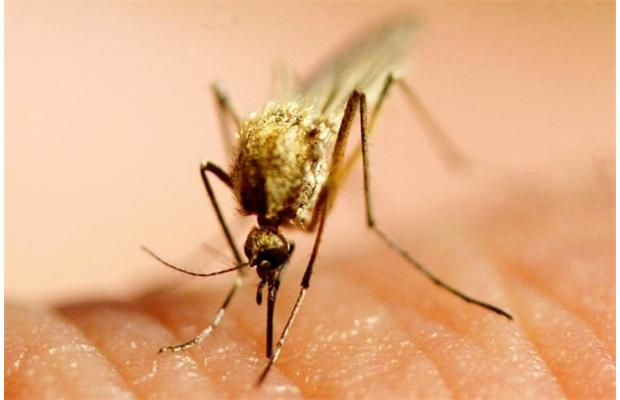TORONTO – It’s hot and rainy this summer, the perfect climate for mosquitoes. Canadians know the blood-sucking insects well – sometimes, we’re swatting them away from us but most of the time, it’s too late. They’ve left their mark and we’re scratching for days.

Global News asked experts why some of us seem to be more vulnerable to mosquito bites than others.
How do mosquitoes zero in on their animal and human prey?
Mosquitoes have very poor vision and first see us by silhouette, according to Dr. Carl Lowenberger. He’s a biology professor with decades of experience in studying mosquitoes and parasites at Simon Fraser University in B.C.
“They’ll see something moving in the forests and their eyes aren’t that great to know what it is, so if they see an animal is moving or a human is moving, they’ll go towards it,” Lowenberger told Global News.
Once they’re within a certain distance, their odour receptors kick in. While their eyesight is poor, their sense of smell more than compensates.
On us, they sniff out the sweat, heat and carbon dioxide we breathe out. It’s especially the case if we’ve had a sweaty day of exercising, hiking or we’re wearing the same clothes out during a camping trip, Lowenberger said.
Read more: UBC scientists develop West Nile virus vaccine for birds
“Then they come close to you and they just go nuts,” Lowenberger said.
- Canadian man dies during Texas Ironman event. His widow wants answers as to why
- ‘Shock and disbelief’ after Manitoba school trustee’s Indigenous comments
- Several baby products have been recalled by Health Canada. Here’s the list
- ‘Sciatica was gone’: hospital performs robot-assisted spinal surgery in Canadian first
Are some of us more vulnerable than others to mosquito bites?
There are urban myths aplenty – if you have sweet blood, mosquitoes may find you tastier, which is among the more popular sayings.
It’s not true, though. Mosquitoes can’t distinguish blood quality.
So far, studies haven’t been able to link any relationship to eating certain foods to lure in mosquitoes (bananas) or keep them away (garlic).
“Some people argue you shouldn’t eat certain fruits or vegetables or eat garlic,” Lowenberger said.
Garlic excretes compounds through our kidneys and out through urine. You’d have to consume a lot of garlic to get to concentrations so high, it’d be secreted through the skin.
“You’d have to eat so much garlic that you’d have no friends. You’re better off rubbing garlic oil on your skin,” Lowenberger said, warning that that measure isn’t scientifically supported.
“There are no good studies to correlate a link at all,” Dr. Sandra Hong said. She’s an allergist and practicing physician with the Cleveland Clinic.
One study did note that alcohol, such as beer, seemed to attract insects, though, Hong said.
Read more: 6 Canadian game-changing ideas for global health care
Those with diabetes and high blood pressure are also off the hook – there’s been no conclusive research that pegs these chronic conditions to being tastier targets for mosquitoes.
Another notion is that pregnant women and those who are heavier may be more vulnerable. Lowenberger said it may be because they exert more energy, sweat more and release more carbon dioxide.
Hormonal changes in pregnant women could also be at play.
Read more: Mosquitoes in Toronto test positive for West Nile virus
But, overall, these bloodsuckers don’t discriminate. Across the board, carbon dioxide, sweat and heat seem to be the trifecta for attracting mosquitoes.
“If you’re a warm body, they’ll bite you,” Lowenberger said.
What should you do if you’ve been bitten?
For starters, it’s only female mosquitoes that bite mammals. The insects thrive on sugar so they normally tap plants for sap, for example. But the females need protein so they use a modified part of their mouthpiece to pierce the skin and take blood – that protein from our blood is used to form eggs.
“They’re not doing anything evil to get back at humans, they’re just trying to get a meal so they can have offspring,” Lowenberger said.
The process can take between 30 seconds and two minutes. There is one thousand microlitres in a millimeter – a mosquito draws only three of these minuscule units.
We usually don’t feel the bite because the mosquito adds a local anaesthetic. But it’s her saliva – meant to prevent the blood from coagulating when she sucks it up – that causes the bite to flare up.
Read more: 2012 broke the record for West Nile virus deaths, but not for illnesses: US health officials
“Your body tries to isolate the area where the saliva is and that’s how you get a bump where the mouthpiece went in. Your body isolates the area and brings in immune machinery to wipe out the saliva so the area is walled off,” Lowenberger said.
Our bodies develop an inflammatory response and the more we scratch, the more inflamed it becomes, Hong said.
“It can become a vicious cycle,” she told Global News.
Some kids even encounter a mild allergic response called Skeeter syndrome.
Can we protect ourselves from mosquito bites?
Public health officials say that people should avoid the outdoors at dawn and dusk, when mosquitoes seem to be on the prowl.
Other studies suggest wearing light clothes, but Lowenberger isn’t sure if that’s the case.
Some experts even recommend showering or rinsing away sweat, or changing out of dirty clothes.
Your best bet is DEET, a chemical spray that can confuse mosquitoes’ olfactory receptors and throw them off. They may be near you, but they won’t necessarily bite.
Read more: Province warns about risk of West Nile virus
Lowenberger reminds Canadians that we could have it a lot worse.
“For us in Canada, it’s a nuisance but in other parts of the world, they represent a potential parasite and potential death,” he said, noting that some of the bugs carry malaria and even Dengue virus.
carmen.chai@globalnews.ca




Comments